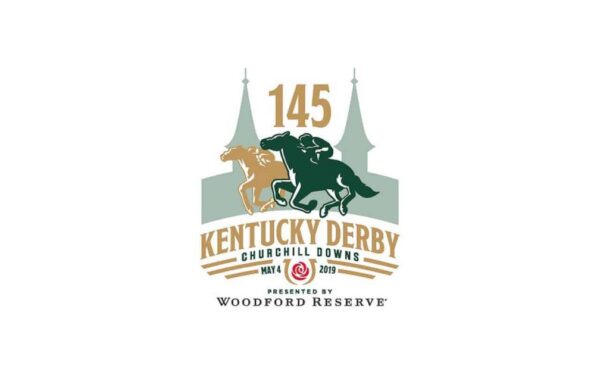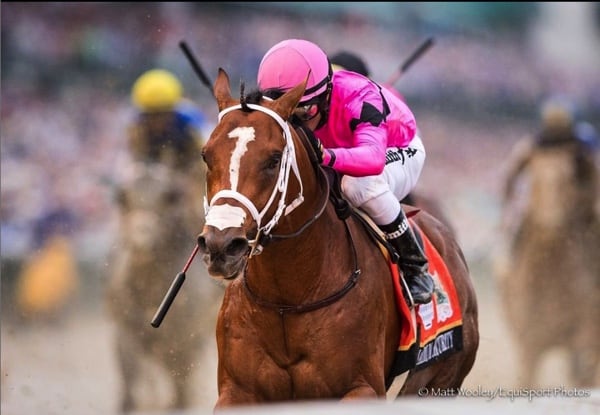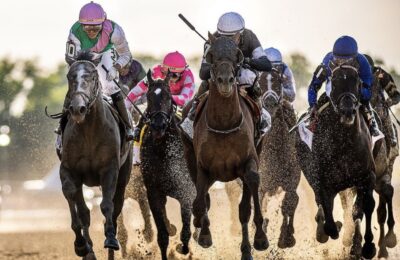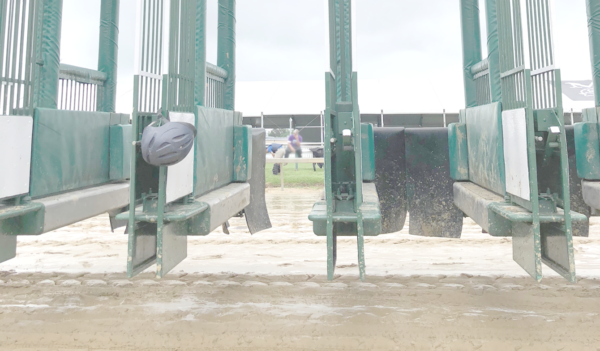
Thoughts on the 145th Running of the Kentucky Derby
The 145th, known heretofore as the craziest Kentucky Derby ever! I will endeavor to clear up a few questions I’ve been asked, and in the process bust a few myths and opine here and there. I’ll try to go in chronological order. Perhaps John Steinbeck said it best—even back in 1956:
“This Kentucky Derby, whatever it is—a race, an emotion, a turbulence, an explosion—is one of the most beautiful and violent and satisfying things I have ever experienced.”
Interviewing the “winning” connections:
No, I could not see the race. From my position on horseback I stand behind the starting gate as the horses leave the gate for the Kentucky Derby. Then, while the horses are racing in a counter clockwise direction, my horse and I gallop around the track along the outside fence, in a clockwise motion. As the horses head toward us down the backside we pull up on the outside fence (with two Churchill Downs outriders alongside) and stand still as the pack of horses races past us. This is at about the ½-mile pole.
Once the horses have passed, we then proceed down the backside so that we will be in position to meet the winning jockey after the race. I am listening to Larry Collmus’s call of the race (through my NBC earpiece) throughout, but see only the small portion of the race where the horses race past me at the ½-mile pole.
When the horses pass the finish line and I know who the winner is, I may take a quick glance at my notes (or not) and then, once clear of the other horses who are galloping out after the race, I approach the winning rider who by then, is already with the outrider—after the Kentucky Derby, that outrider is Greg Blasi.
The Claim of Foul:
Churchill Downs has what is referred to as “fast official” which means that if a jockey wishes to lodge a claim of foul against another competitor, they are required to do so as they are galloping out. They lodge this claim of foul with one of the outriders and the outrider relays the information to the stewards. If a claim of foul has been lodged against the winning rider in this timely manner, then it is normally lodged before I would have a chance to approach the winning rider for an interview.
And if a claim of foul has been lodged, then I am not allowed to interview the jockey. If I did I would be “detaining a witness”. The stewards want the jockey to be able to get back to the unsaddling area and on the phone with them right away so that they can speak with the rider to gain his/her perspective of the situation in question.
In the case of this year’s Kentucky Derby, neither I nor the outrider who was leading Saez’s horse back were notified of a claim of foul. I subsequently learned that the foul was lodged with one of the outriders during the time that I was interviewing Saez. We (NBC) did not learn about a claim of foul until after our correspondent, Nick Luck, had interviewed “winning” trainer, Jason Servis.
After interviewing Saez I returned to the frontside of the track and from there, could see that the stewards were looking at a situation around the turn and from several different camera views (what they were viewing was also being shown on the infield big screen). It did not take me long to realize that a rather egregious infraction had occurred. In fact, I would say that within five minutes I knew the number was coming down. So, what took so long for the stewards to make their decision?
The 22 minute wait:
In this situation Maximum Security had bothered, not one horse, but several horses. So the stewards had to watch the replays over and over and over again to figure out exactly how many horses he had interfered with, who those horses were, and where they finished, so that they could place the offending horse behind the offended. And, for Pete’s sake, it’s the Kentucky Derby, you have to get it right.
In addition to that, the stewards said that when the objection from Prat came in they were in the midst of deciding who they would call “specials” on. The first place finisher of every race is always (urine and blood) tested at the detention barn after the race but there are also “specials” called on other horses. These can be horses that either under-performed or over-performed (based on their odds) or are simply randomly selected.
And then, of course, in the midst of all of this, they get the subsequent phone call from Jon Court (rider of Long Range Toddy) who also claimed to have been interfered with. He did not lodge his claim of foul with one of the outriders, he waited until he got back and picked up the phone and the riders’ scale and called the stewards.
No “Inquiry” sign posted:
Everyone is up in arms that the stewards didn’t also post the “Inquiry” sign and I get that—they should have. But once you step back and look at all of the matters that the stewards were handling, it’s a little easier to see how posting the inquiry sign either slipped their minds or seemed like a moot point.
Did they make the right call?:
Fast forward to the ultimate disqualification. Yes, I believe the stewards made the right decision. You can move from the 2 path to the 12 path as long as you are clear of other horses but you cannot move from the 2 to 5 path suddenly and unpredictably and impede the progress of other horses. In this case Maximum Security’s abrupt course-change nearly caused another horse (or more) to fall. That could’ve been really bad.
I’ve watched the replay of the Kentucky Derby a hundred times and from multiple angles. Yes, I’ve seen every video that has been posted on Twitter, the Courier-Journal, Facebook, etc. No, there is no compelling evidence to convince me that anyone caused Maximum Security to spook and duck out other than the crowd noise. When you slow the footage down to a snail’s pace, it obfuscates the split second in which this happened and makes it look like the riders behind Saez had more time to react. They had a split second. No more.
What exactly happened?:
I have never ridden in the Kentucky Derby, but I’ve been on the track for it. From my own experience and from what the jockeys tell me who have ridden in the Kentucky Derby, the noise from the crowd when they begin to turn for home is literally like hitting a wall of sound.
Horses are herd animals and Maximum Security is a young, lightly raced horse. Yes, they are all three years old, but Maximum Security had only raced one time at age two, and of the four times that he had raced prior to the Kentucky Derby, he had never faced anything like what he experienced with the crowd and crowd noise of the Derby.
In watching the reply (again and again and again) it looks like he began to come out of the final turn, heard the crowd noise and went, “What the ____??? I’m not going out there by myself! No way!!!” In an effort to shy away, he ducked out sharply and in so doing, lost just enough momentum for the other horses to catch him.
Again, they are herd animals. So, when the other horses joined him he became a bit more confident, emboldened if you will, and began to run with the speed with which he had been blessed. But, the damage had been done.
Was Luis Saez at fault?:
With regard to Luis Saez’s contribution to any of this—or lack thereof, I hold Saez blameless in his actions. His horse simply shied and ducked. Saez immediately made every action to correct him. It’s important to note that he used both the left rein (to pull him back into his previously established running path) and his riding crop (slapping Maximum Security’s shoulder repeatedly) to right his course. I really did not believe that Saez would receive a riding suspension.
The riding suspension:
However, in the aftermath of it all, Saez refused to admit that his horse’s actions had put anyone in harm’s way. I get why he adopted this position immediately—he didn’t want his horse to be disqualified—but once the horse was disqualified and once the replays showed irrefutable evidence to the contrary, it’s time to admit that his horse clearly ducked out and impeded the path(s) of others.
As an apprentice rider you are required to view racing films every day with the stewards. It’s part of the learning process. So, even if you haven’t done anything wrong in a race—even if you didn’t ride the day before—you have to view any and all films that the stewards are reviewing with other riders so that you can learn from their mistakes (or their horse’s mistakes). It’s not unusual for a horse to be disqualified even though the rider isn’t given a suspension because, as was the case with Saez and Maximum Security, in many cases it is simply the horse making a sharp right or left while the jockey is doing all they can to correct their course. It is in these film-viewing sessions that a young rider learns what to say—and what not to say.
So, you will ask me, if Saez was doing what he could to correct Maximum Security, why was he suspensded? While I hold Saez blameless for his actions, he did not articulate a better understanding of the situation in its aftermath:
The stewards need to hear from the jockey that the rider understands why what happened was potentially dangerous to others. And the stewards need to believe that the jockey did all he or she could to prevent/correct the dangerous situation, and that they would do everything to prevent this type of situation for reoccurring in the future (if possible).
It’s possible that Saez was under advice from his attorney—and the Wests’ attorney—to deny, deny, deny. But, by not admitting that his horse’s actions put others in danger, he put himself in a position to get the riding suspension. Add to this that Saez had already had multiple riding suspensions, and it becomes easy to imagine that the stewards might think, “Well, he cannot see how he endangered others and he’s already had multiple 7-day suspensions. Perhaps he needs a 15-day break from racing this time to see his way clear.” While I put the stewards’ plausible thoughts in quotations here, I will add that I have not spoken with the stewards nor am I speaking for them. Simply opining.
THE 20 HORSE FIELD:
I do not believe that the Kentucky Derby should be adjudicated differently than any other race—in fact, it should be held to even higher standard. I do not believe that the 20 horse field had anythingto do with this and I don’t think the field size for the Derby should be reduced, although it would be fine with me if it were. I’ve covered the Derby for 19 years now for NBC Sports and not even once have I ever heard a rider complain that there were too many horses in the race.
I do believe that adding a 20 horse starting gate to Churchill Downs’ set of starting gates would be a great idea, but of course, this has nothing to do with this year’s incident. Going forward, anytime there is a 20 horse field in the Derby, the horse in the #1 post will always be at a disadvantage because they are 3-4 strides away from running into the inside fence and so that horse’s rider is forced to send hard or take back. This is not a good position to be in and it should be a fair start for everyone. But, alas, I digress.
On Addressing the argument: “I’VE SEEN 5 OR 6 KENTUCKY DERBIES THAT WERE ROUGHER THAN the 145th AND NO ONE WAS DISQUALIFIED!”
Really? Name one. I can’t tell you how many times I’ve heard this and, yet, aside from pointing out interference at the start of the race, no one has been able to identify a Kentucky Derby winner who interfered with other horses more egregiously than Maximum Security did during the running of this race.
As for the start, all bets are off there and they always have been. The logic is (and I believe it is sound logic) that a horse has the entire rest of the race to overcome trouble at the start. Add to that that 98.5% of horses break relatively straight, which is what a jockey is always intending and expecting.
When a horse breaks sharply to the left or right, it is very difficult to anticipate this and it takes 2-3 jumps to correct. As long as the jockey appears to be doing all they can to correct a wayward horse’s sharp turn at the start, they will rarely be disqualified for their horse’s mistake. This is just the way it is.
FINAL THOUGHTS:
All of that said, I understand that others will harbor opinions not aligned with mine and I’m ok with that. My mother was a jockey. My brother and sister were both jockeys. I was a jockey. I have thusly spent my entire life seeing and assessing situations just like the ones outlined above—they just weren’t in the Kentucky Derby.
All of the opinions stated here are my own and I respect everyone else’s opinions as well.
Namaste (the light in me honors the light in you),
Donna
SUBSCRIBE NOW, TO GET NEW POSTS FROM DONNA, DELIVERED TO YOUR INBOX.




16 Comments
sharon rosenblum
hello ms.brothers-
maybe i haven’t watched the overhead enuf, altho an overhead can’t show you feet (hooves). if i saw a side-by-side of the overhead and the angle that shows wow’s hooves beginning to come in-between maximum security’s hind legs i would feel better about any decision. however, i am about the only person i know that maintains to this day that big brown interfered with 8 belles in almost the exact same manner. i believe saez and his horse averted a disaster thru dumb luck. merasmag
Domenic Avellino
Hi Donna, I’ve been watching, wagering and going to the track for 40 years and I have to say you enlighten me on so manythings that are done behind the scenes that people don’t knowboe ever see. Thank you for the brief education and opening my eyes to seeing things correctly and in the proper perspective… Your article was amazing and well written.
By the way I love watching you on TV!!
Thanks again and God Bless xo
Deb Conlee
Great insight and article. I’m glad there was no tragedy, cause clipping heals can certainly get to that point. I’ve heard folks in other sports debating about whether an infraction in the bush leagues should be called in a pro playoff game. I believe that rules are rules, whether at Turf Paradise, or CD. We must, with the prevailing challenges to racing, do our best to protect the integrity of the sport, as well as the safety of all concerned. All of Those horses came home safe, and that’s worth protecting.
Leu*Lieu Star
Maximum Security (and the rest of em) showed excellent behavior. Max Security did EXACTLY what he/she was told to do).
 Their new One
Their new One
Jorge Colón
Hi Donna,
Absolutely essential information presented in a factual professional manner, thanks!
I do have a question that I haven’t seen answered or addressed: would the stewards have reviewed the tape and disqualified Maximum Security had no objections been filed? I completely agree with your explanations and conclusion and have spent significant amount of time trying to make friends/colleagues understand that the stewards had to follow and implement the rules because an objection had been filed by at least one horse that did get impeded; at that point the decision to disqualify was obvious and necessary. But can / would the stewards review and disqualify based on clear-cut interference if no jockey had objected? Clearly would mark the difference between stewards upholding the rules versus stewards imposing the rules based on subjective opinion. Because my experience so far is people crying that they see fouls like these all the time and therefore the stewards took it upon themselves to change the outcome of the Derby.
This might be something beneficial to clear up while you guys try to navigate the airing of the Preakness.
Thanks! The whole family is a big fan of yours!
Jorge Colón DVM MBA
Lexington, KY
Donna Brothers
Really good question–and points–only wish we had time to delve into it that deeply on our show. To answer your question, I have not spoken with the stewards but from what I have seen from their comments–and from my own experience with the Kentucky stewards–yes, they would’ve hung up the Inquiry sign had no objection been lodged. I do know that they watch the entire running of every race–both the pan shot and the head-on–before declaring a race official. The incident that caused the disqualification was not immediately apparent to most from the pan shot and perhaps the stewards did not immediately see it either. And it takes a bit of time to run the full replays (pan and head-on) on a race that takes just over 2 minutes to complete.
But your greater point is an interesting proposition and, as you said, “Clearly would mark the difference between stewards upholding the rules versus stewards imposing the rules based on subjective opinion.” And so while it would not have been a popular decision, I do believe that the stewards would have (and, yes, could have) disqualified Maximum Security even in the absence of an objection.
Thanks for the kind words, Jorge! And please give my best to your whole family!
Be well,
Donna
Spencer Robinson
Donna, In an age of less than thoughtful debate, I appreciate your post. From my perspective, the initial contact comes from War of Will (who was rank throughout), and being hit from behind in a turn would clearly explain a horse that shifts lanes. This line of thought doesn’t seem to be discussed much in the media, despite there being images of the contact while Maximum Security is in his lane. As for the riding suspension, it’s hard to explain other than vindictiveness, which combined with a “press” conference with no questions, indicates to me that wholesale changes need to be made to how stewards conduct business.
Donna Brothers
Spencer, we’ll have to agree to disagree on who initiated the contact but thank for sharing your thoughts with me–I value them.
Re: Saez’s suspension, I understand your frustration and you’re not the only one who believes Saez was treated harshly–or unfairly. However, Saez and has had multiple riding suspensions–and 4 in the state of Kentucky over the past couple of years. Tim Sullivan from the Courier-Journal may’ve said it best:
[Context counts. If the stewards were guilty of piling on when they imposed a 15-day suspension after stripping Saez of the greatest victory of his career, the jockey can’t qualify as a total innocent after so many previous penalties. In sports, as in courts, sanctions tend to escalate as infractions accumulate.
“If you give a jockey two or three penalties and they just don’t get it, I up the ante until you find the level where they start correcting …” Del Mar steward Kim Sawyer said Thursday. “If you get riders and they get those kind of penalties and they still don’t pay attention, you have to control the safety of your races.”]
Here’s a link to his article if you’re interested in reading it: https://www.courier-journal.com/story/sports/2019/05/16/jockey-luis-saez-appeal-complicated-past-suspensions/3695262002/
Thanks for the dialog.
Be well,
Donna
Joseph Kleier
Great read Donna….you’re not one of my favorites (you dissed me on CD’s backside one BC morning when I asked you a simple question) but you saw it the way I saw it. Everybody keeps saying they’ve seen worse during previous Derbys, I’m like you and people from Missouri “show me”. Everybody has an opinion but CD has been doing the Derby for 145 years, I think they might know what they’re doing. Peace out
Donna Brothers
Joseph,
I sincerely apologize if you felt dissed by me upon our encounter. I would never intentionally disrespect anyone. I’m not sure what the context was of our encounter but please understand that when I am at the track I am often working–either in a hurry to see a horse that is about to go to the track or looking for someone in particular I need to talk to (about a horse in particular), or, given the complexity of horse racing, any number of other things.
In fact, people get upset with me all the time because they say Hi to me when I’m on the air (perhaps they don’t realize I’m on air?) or in the middle of a show without understanding that with the show’s program in my ear full blast, the greater likelihood is that I simply could not hear them say hello to me.
So, again, please forgive me. I would never have disrespected or disregarded you on purpose.
And thanks for the kind words–in spite of the fact that I am not one of your favorites!
Warm regards,
Donna
Barb France
Bravo! An honest opinion from a jockey and commentator from their position and insight. I could sense something was off with your short interview with Saez yet his adrenaline was still flowing with his win. Hearing from your perspective just confirms my opinion. Great job as always….thanks for your professionalism!?
Donna Brothers
How kind, thank you, Barb!
Peter Monaco
My God, woman, perfect, thank you. I hope someday soon we can all put this to bed and move on.
AND, hopefully, most might realize that you know a tad about this shit and maybe have replayed a race or two over your 100 years in the biz.
Good insight from a smart cookie, and I’ll say it again, I don’t know why we ever broke up????
Donna Brothers
Thanks, Peter! Wow “100 years in the biz”. I must look great for my perceived age! Or horrible for my actual age ?. Either way, I’ll take the compliment–thank you!
RT
Bravo. Well put. My policeman brother called and said, “Maximum Security got f**ked.” I asked him, “when you pull someone over for speeding, do you give them a ticket for a) it’s against the rules, or b) the potential danger of a speeder?” He hung up on me. It would have been catastrophic to the horses and riders at that strategic point had heels clipped or a slip occurred. The choice of the stewards is correct today and more importantly, it sets a precedent for the future.
Donna Brothers
Thanks, RT! I love your analogy. Well played!